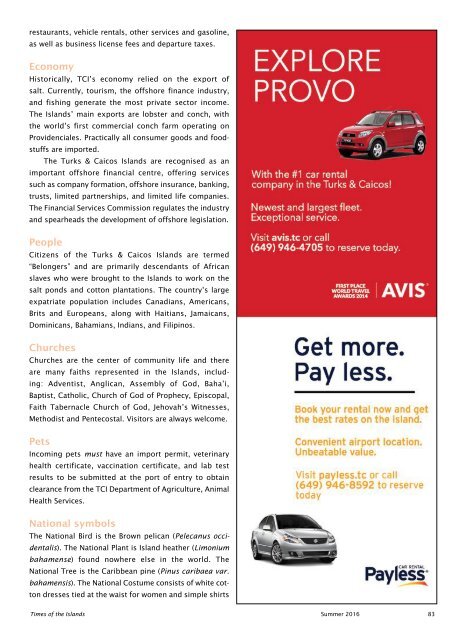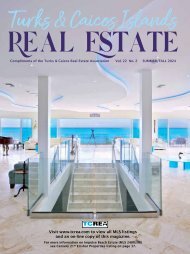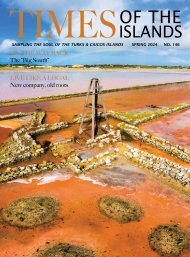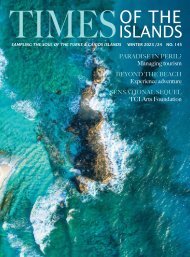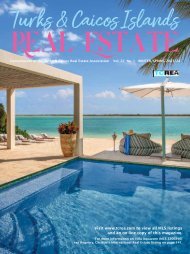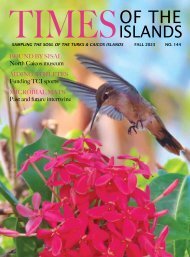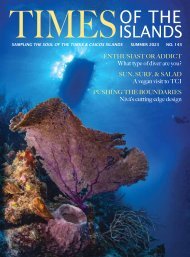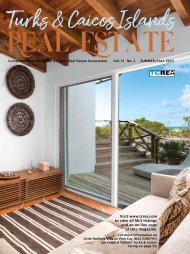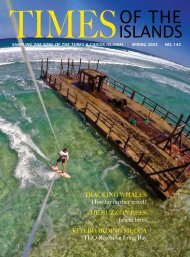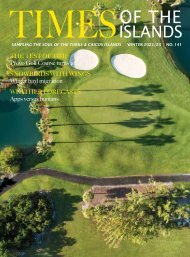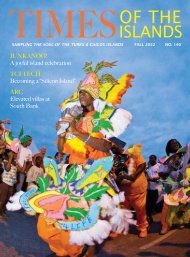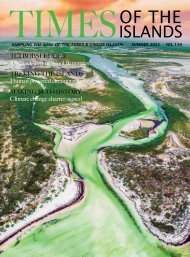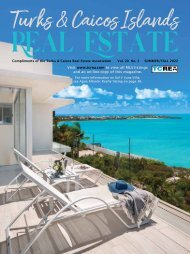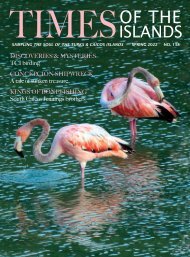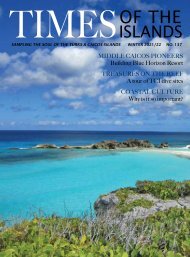Times of the Islands Summer 2016
Presents the "soul of the Turks & Caicos Islands" with in-depth features about local people, culture, history, environment, businesses, resorts, restaurants and activities.
Presents the "soul of the Turks & Caicos Islands" with in-depth features about local people, culture, history, environment, businesses, resorts, restaurants and activities.
Create successful ePaper yourself
Turn your PDF publications into a flip-book with our unique Google optimized e-Paper software.
estaurants, vehicle rentals, o<strong>the</strong>r services and gasoline,<br />
as well as business license fees and departure taxes.<br />
Economy<br />
Historically, TCI’s economy relied on <strong>the</strong> export <strong>of</strong><br />
salt. Currently, tourism, <strong>the</strong> <strong>of</strong>fshore finance industry,<br />
and fishing generate <strong>the</strong> most private sector income.<br />
The <strong>Islands</strong>’ main exports are lobster and conch, with<br />
<strong>the</strong> world’s first commercial conch farm operating on<br />
Providenciales. Practically all consumer goods and foodstuffs<br />
are imported.<br />
The Turks & Caicos <strong>Islands</strong> are recognised as an<br />
important <strong>of</strong>fshore financial centre, <strong>of</strong>fering services<br />
such as company formation, <strong>of</strong>fshore insurance, banking,<br />
trusts, limited partnerships, and limited life companies.<br />
The Financial Services Commission regulates <strong>the</strong> industry<br />
and spearheads <strong>the</strong> development <strong>of</strong> <strong>of</strong>fshore legislation.<br />
People<br />
Citizens <strong>of</strong> <strong>the</strong> Turks & Caicos <strong>Islands</strong> are termed<br />
“Belongers” and are primarily descendants <strong>of</strong> African<br />
slaves who were brought to <strong>the</strong> <strong>Islands</strong> to work on <strong>the</strong><br />
salt ponds and cotton plantations. The country’s large<br />
expatriate population includes Canadians, Americans,<br />
Brits and Europeans, along with Haitians, Jamaicans,<br />
Dominicans, Bahamians, Indians, and Filipinos.<br />
Churches<br />
Churches are <strong>the</strong> center <strong>of</strong> community life and <strong>the</strong>re<br />
are many faiths represented in <strong>the</strong> <strong>Islands</strong>, including:<br />
Adventist, Anglican, Assembly <strong>of</strong> God, Baha’i,<br />
Baptist, Catholic, Church <strong>of</strong> God <strong>of</strong> Prophecy, Episcopal,<br />
Faith Tabernacle Church <strong>of</strong> God, Jehovah’s Witnesses,<br />
Methodist and Pentecostal. Visitors are always welcome.<br />
Pets<br />
Incoming pets must have an import permit, veterinary<br />
health certificate, vaccination certificate, and lab test<br />
results to be submitted at <strong>the</strong> port <strong>of</strong> entry to obtain<br />
clearance from <strong>the</strong> TCI Department <strong>of</strong> Agriculture, Animal<br />
Health Services.<br />
National symbols<br />
The National Bird is <strong>the</strong> Brown pelican (Pelecanus occidentalis).<br />
The National Plant is Island hea<strong>the</strong>r (Limonium<br />
bahamense) found nowhere else in <strong>the</strong> world. The<br />
National Tree is <strong>the</strong> Caribbean pine (Pinus caribaea var.<br />
bahamensis). The National Costume consists <strong>of</strong> white cotton<br />
dresses tied at <strong>the</strong> waist for women and simple shirts<br />
<strong>Times</strong> <strong>of</strong> <strong>the</strong> <strong>Islands</strong> <strong>Summer</strong> <strong>2016</strong> 83


